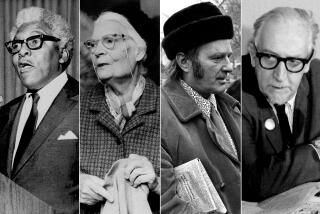Peace to Men of Good Will Who Serve the World Selflessly
- Share via
There is a great deal more peace and good will among men this Christmas than anyone had a right to expect a year ago. This is due, in considerable part, to the disinterested efforts of a number of people willing to attack problems that most others in public life had become content to ignore or had despaired of settling.
The Secretary General of the United Nations, Javier Perez de Cuellar, has been indefatigable--and ultimately successful--in his effort to bring about a cease-fire in the Iran-Iraq war and to find terms on which a Soviet withdrawal from Afghanistan could be accomplished. U.S. Assistant Secretary of State Chester A. Crocker has done a signal service with his long and complex campaign to find a solution to the Namibian problem and the Angolan civil war. Both acted in the line of duty, but they took seriously responsibilities that others had taken perfunctorily.
The Swedish Foreign Office and diplomatic service, acting with the cooperation of the Egyptian Foreign Ministry and President Hosni Mubarak, have demonstrated what professionalism and moral determination could do to shift the Middle East from stalemate. In establishing a dialogue between the Palestine Liberation Organization and the United States, Foreign Minister Sten Sture Andersson and his colleagues acted out of a disinterested concern to reduce violence and individual suffering.
Those in the American Jewish community willing to work with the Swedes--Stanley Sheinbaum of the Center for the Study of Democratic Institutions and his associates--risked considerable personal costs because they appreciated the opportunity that the Swedish initiative could offer both sides in the Israeli-Palestinian conflict. Again, there was a moral motivation.
East-West relations have changed because of Mikhail Gorbachev’s realism and Ronald Reagan’s willingness to take Soviet initiatives seriously. In this case, both acted in conscious pursuit of national interest; nonetheless, their action as individuals counted.
This writer is ordinarily inclined toward a pessimistic view of how the world works, and to skepticism about its reform, but a systematic pessimism is a mistake. Good will is a force in public affairs.
Good is not much talked about; it is a subject that tends to embarrass, when brought up outside the conventional formulations of religion. Public men do not ordinarily discourse on virtue, nor much claim it, but it is a quality inseparable from greatness.
Most figures in history whom we think of as having possessed greatness are also likely to be seen as possessing virtue. The names in the American political pantheon --Washington and Jefferson, Lincoln, Lee --all possessed a quality of disinterestedness, of obligation to interests apart from their own, however flawed or compromised by circumstance and social outlook and ambition each may have been.
This is true of DeGaulle or Churchill or Monnet, or of the Adenauer who waited in Cologne, in and out of prison, until his 73rd year, to reconstruct his morally ravaged nation and give it back its honor. When Jean Monnet proposed Konrad Adenauer the pooling of German and French steel and coal production, which was eventually to become the European Community, he said that the plan was not really technical but “essentially political; it even has an aspect which might be called moral.” Adenauer replied, “This project is of the highest importance. It is a matter of morality. We have a moral and not just technical responsibility to our people.”
As religious feast days go, Christmas is a sentimental one, of God’s benevolence rather than man’s obligation to sacrifice or virtue. The Victorians turned it into a children’s and families’ celebration, which it remains today, despite the commercial battering it has been given in recent years. At its core, though, there is nothing sentimental.
Christmas observes the birth of an artisan’s child, destined to an austere life in a society of herders and peasants, eventually to false arrest, torture and a peculiarly painful form of execution, the avowed purpose of his life and death being the release of mankind from the burden of a primal sin.
It is our habit to skirt the primordial issues of moral personality and moral responsibility in public life, as in private life, offering to ourselves the alibis of expedience and necessity. Still, sooner or later, they have to be confronted, whether or not one accepts the New Testament account of divine redemption, or the Old Testament account of Adam’s sin, since the response to these questions defines a life.
Virtue is a public as well as private issue, uncomfortable as that may be, or become. Virtue is a force in political life and in history. It is useful to be reminded of this, as we are this Christmas.
DR, J MORIN, The Miami Herald
More to Read
Sign up for Essential California
The most important California stories and recommendations in your inbox every morning.
You may occasionally receive promotional content from the Los Angeles Times.













